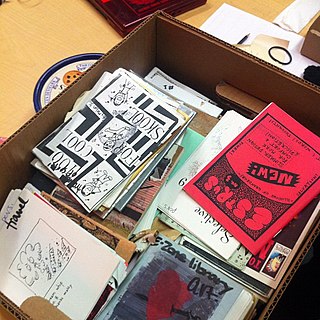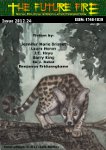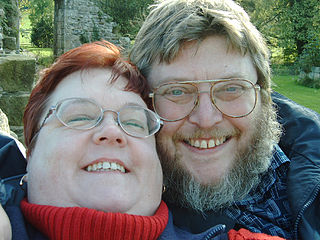A fanzine is a non-professional and non-official publication produced by enthusiasts of a particular cultural phenomenon for the pleasure of others who share their interest. The term was coined in an October 1940 science fiction fanzine by Russ Chauvenet and first popularized within science fiction fandom, and from there it was adopted by other communities.

Science fiction fandom or SF fandom is a community or fandom of people interested in science fiction in contact with one another based upon that interest. SF fandom has a life of its own, but not much in the way of formal organization.

A zine is a small-circulation self-published work of original or appropriated texts and images, usually reproduced via a copy machine. Zines are the product of either a single person or of a very small group, and are popularly photocopied into physical prints for circulation. A fanzine is a non-professional and non-official publication produced by enthusiasts of a particular cultural phenomenon for the pleasure of others who share their interest. The term was coined in an October 1940 science fiction fanzine by Russ Chauvenet and popularized within science fiction fandom, entering the Oxford English Dictionary in 1949.

A science-fiction fanzine is an amateur or semi-professional magazine published by members of science-fiction fandom, from the 1930s to the present day. They were one of the earliest forms of fanzine, within one of which the term "fanzine" was coined, and at one time constituted the primary type of science-fictional fannish activity ("fanac").

Tom Reamy was an American science fiction and fantasy author and a key figure in 1960s and 1970s science fiction fandom. He died prior to the publication of his first novel; his work is primarily dark fantasy.

Dreamwatch was a British magazine covering science fiction and fantasy films, books and television programmes.

The British Science Fiction Association Limited is an organisation founded in 1958 by a group of British academics, science fiction fans, authors, publishers and booksellers, in order to promote the writing, criticism, and study of science fiction in every form. The first President of the BSFA was Brian Aldiss. Pat Cadigan became president in August 2020, and Tade Thompson became the Vice President in June 2021.
Eurocon is an annual science fiction convention held in Europe. The organising committee of each Eurocon is selected by vote of the participants of the previous event. The procedure is coordinated by the European Science Fiction Society. The first Eurocon was held in Trieste, Italy, in 1972. Unlike Worldcons, Eurocon is usually a title attached to an existing convention. The European SF Awards are given in most of the conventions giving recognition to the best works and achievements in science fiction.

Patrick James Nielsen Hayden, is an American science fiction editor, fan, fanzine publisher, essayist, reviewer, anthologist, teacher and blogger. He is a World Fantasy Award and Hugo Award winner, and is an editor and the Manager of Science Fiction at Tor Books.
Locus: The Magazine of The Science Fiction & Fantasy Field, founded in 1968, is an American magazine published monthly in Oakland, California. It is the news organ and trade journal for the English-language science fiction and fantasy fields. It also publishes comprehensive listings of all new books published in the genres. The magazine also presents the annual Locus Awards. Locus Online was launched in April 1997, as a semi-autonomous web version of Locus Magazine.

Charles Nikki Brown was an American publishing editor, the co-founder and editor of Locus, the long-running news and reviews magazine covering the genres of science fiction and fantasy literature. Brown was born on June 24, 1937, in Brooklyn, New York. He attended City College until 1956, when he joined the military at age 18; Brown served in the United States Navy for three years. Following his discharge from navy service, he went to work as a nuclear engineer but later on changed careers and entered the publishing field; Brown became a full-time science fiction editor with Locus in 1975.
Donald Henry Tuck was an Australian bibliographer of science fiction, fantasy and weird fiction. His works were "among the most extensive produced since the pioneering work of Everett F. Bleiler."
The WSFA Journal is a science fiction fanzine that has been published approximately once a month since 1965 by the Washington Science Fiction Association (WSFA).

Peter Weston was a British science fiction fan from Birmingham, UK.
Martin Tudor is an active British science fiction fan, editor or co-editor of several science fiction fanzines, and a member of various convention committees, most notably Novacon. He ran the fan programme at the 1987 worldcon in Brighton. In addition, during the early 1990s, he freelanced as a book reviewer for the magazine publisher Pegasus.

The Future Fire is a small press, online science fiction magazine, run by a joint British-US team of editors. The magazine was launched in January 2005 and releases issues four times a year, with stories, articles, and reviews in both HTML and PDF formats. At times issues appeared more sporadically than this.
Science fiction studies is the common name for the academic discipline that studies and researches the history, culture, and works of science fiction and, more broadly, speculative fiction.
Greg Pickersgill, born in Haverfordwest, Wales in 1951, is a British science fiction fan. He lived in London between 1971 and 1992, then returned to Haverfordwest.
The Birmingham Science Fiction Group (BSFG), also known as the "Brum Group", held its first meeting on 25 June 1971. It runs regular meetings in Birmingham, England, where SF fans can meet one another and professionals in the field in a friendly environment, and has organised the annual SF convention Novacon since 1972.

Steve Green is a former newspaper reporter (1978–84) turned freelance journalist, who has also written short fiction and poetry. He is an active member of the science fiction press and fan community.










